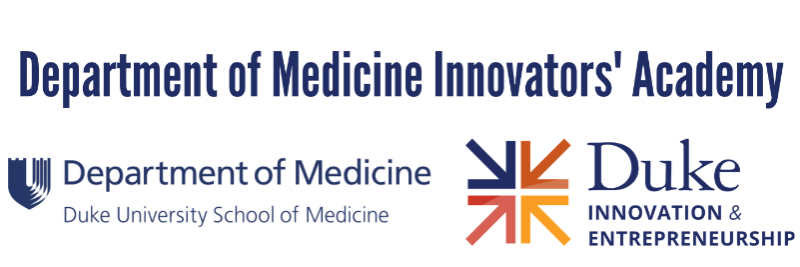
This summer, Department of Medicine leaders collaborated with Duke Innovation and Entrepreneurship Initiative (I&E) to host the inaugural (and online only) Department of Medicine Innovators Academy, an eight-week course customized for early career faculty interested in advancing new ideas, interventions, and technologies.
The academy is the latest activity to arise from the department’s ambitious Research Strategic Plan, which highlighted innovation and entrepreneurship as one of its priorities. During the strategic planning process, many faculty had expressed interest in developing their skills in entrepreneurship.
In response, Kathleen Cooney, MD, chair of the Department of Medicine, and Scott Palmer, MD, MHS, vice chair for research, engaged I&E director Jon Fjeld, PhD, and Sharlini Sankaran, PhD, I&E director of translational programs. Together, they developed the Innovators Academy, a program specifically designed to help early career faculty recognize the potential to develop entrepreneurial ideas for commercialization and understand the wealth of resources at Duke that support innovation.
“I am thrilled that we were able to quickly implement this focus of the Research Strategic Plan and connect our faculty to the expertise in Duke I&E. These experts challenged our faculty to move outside of their comfort zone and think in new and creative ways about their research program development,” said Dr. Palmer.
The program targeted junior faculty within the department. The first class of the Innovators Academy included 19 individuals across every division.
They met in Zoom twice a week for workshops, coaching, and interaction with undergraduate students who helped the faculty complete market research related to their ideas and research projects. Doreen Grech, PhD, Barry Myers, MD, PhD, and Dr. Fjeld served as faculty coaches while Dr. Sankaran served as student coach.
Idea Jam
The Innovators Academy culminated in an Idea Jam in which participants pitched their project proposals to a panel of judges that included outside investors. The judges were looking to award seed money from DOM and I&E to help faculty jumpstart their projects.

After the faculty made their presentations (using tips from earlier coaching sessions), the judges awarded $10,000 each to two projects – to Jatin Roper, MD, assistant professor of medicine (gastroenterology) and Ammon Fager, MD, PhD, assistant professor of medicine (hematology) for their company to develop DK520 as a therapy for inflammatory bowel disease, and to Ravi Karra, MD, assistant professor of medicine (cardiology) for a patient-facing medical ecosystem called Heart to Heart.
Dr. Karra credited the Innovators Academy for helping him to connect with relevant Duke resources in order to advance his project in its early stages.
“As a research scientist, I tend to be conservative in my work and don’t think about entrepreneurship until a very mature stage. However, I learned that good ideas are worth having a conversation about even at early stages,” he said.
The Innovators Academy was created to inspire creative approaches to solving basic and clinical research problems, to encourage the pursuit of traditional and non-traditional funding sources, and to rewire the way early career faculty like Karra think about and approach the concepts of innovation and entrepreneurship.
“We value our early career faculty and endeavor to give them every opportunity to succeed. Regardless of where the participants’ projects end up, we expect that the tools they gained from this training will continue to advance their work in both the research and clinical arenas,” said Dr. Cooney.
Darin Dufault, MD, assistant professor of medicine (Gastroenterology), noted that his experiences in the academy helped him to advance his venture in the design and manufacturing of mobile endoscopy units, an approach he believes will transform the way hospitals deliver gastrointestinal care.
“The practice of innovation is not something routinely taught in graduate or professional school, and this program helped demystify some of the uncertainty by providing introductory skills and early encouragement,” said Dr. Dufault.
Dufault, Karra, and other participants gave the program high ratings, and the Innovators Academy was a win-win for everyone involved, said Dr. Sankaran.
Department and I&E leadership will follow participants as they continue to develop their projects.
“We look forward to continuing to support the innovative faculty who participated in the first Innovators Academy as they move their ideas forward to the benefit of patients and providers,” said Dr. Fjeld.
To learn more about the Academy or other I&E training opportunities and resources, visit entrepreneurship.duke.edu.
Academy participants
The following faculty participated in the 2020 Department of Medicine Innovators Academy.
| Name | Division | Project |
|---|---|---|
| Dennis Abraham, MD | Cardiology | Targeting TREK-1 as a Novel Therapy for Fibrotic Diseases |
| Anastasia Alexopoulos, MBBS | Endocrinology, Metabolism, and Nutrition | An EHR-based platform integrating NLP methods to facilitate evidence-based care and Drive better outcomes in diabetes (END Diabetes) |
| Diego Bohorquez, PhD | Gastroenterology | Gastronauts: A scientific venue for investigators to create and communicate the future of gut-brain matters |
| Darin Dufault, MD | Gastrorenterology | Improving Access to Endoscopic Services with a Mobile Endoscopy Program |
| Alexander Grabner, MD | Nephrology | Translational Research Hub to Establish, Validate and Commercialize Novel Treatments for Cardiovascular Disease and Heart Failure Specific to Chronic Kidney Disease |
| Gentzon Hall, MD, PhD | Nephrology | Exploration of IL-15 as a Potential Podocyte-sparing Therapy for FSGS and Other Forms of Nephrotic Syndrome |
| Arif Kamal, MD | Medical Oncology | Patient- and Caregiver-facing Education and Engagement Tool to Promote Patient Requests for Palliative Care Referrals |
| Ravi Karra, MD | Cardiology | A Patient-Facing Medical Ecosystem |
| Samira Musah, PhD | Engineering and Nephrology | An Artificial Kidney Device |
| Opeyemi Olabisi, MD, PhD | Nephrology | Individualized Therapy for APOL1 Associated Kidney Disease |
| Jatin Roper, MD and Ammon Fager, MD | Gastroenterology (Roper) and Hematology (Fager) | A Company to Develop DK520 as a Therapy for Inflammatory Bowel Disease |
| Matt Rubach MD | Infectious Diseases | A Business-based, Free-enterprise Solution to Expand Access to High-quality Healthcare and Improve Health Equity in Sub-Saharan Africa |
| Kathryn Starr, PhD and Richard Lee, MD | Geriatrics (Starr) and Endocrinology, Metabolism, and Nutrition (Lee) | Improving Physical Function in Older Adults Using Live, Individualized, Small Group Resistance Training Utilizing Video Conference Technology |
| Anthony Sung, MD and Daniel Parker, MD | Hematologic Malignancies and Cellular Therapy (Sung) and Geriatrics (Parker) | Improving Allogenic Hematopoietic Stem Cell Transplantation (HCT) Outcomes with Data |
| Theresa Tarrant, MD | Rheumatology and Immunology | Cellular Conveyed Phototherapeutics to Treat Arthritis |
| Ting Yang, MD, PhD | Nephrology | Novel Anti-HPV treatment using juice extraction from Cynanchum chinense R. Br. |